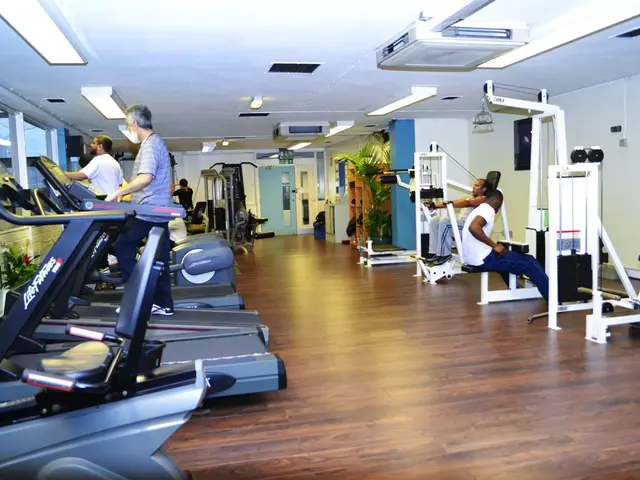Unauthorized Exposure of 21 Million Workplace Screenshots by a Surveillance Corporation Online
In the modern digital age, corporations are increasingly spying on their employees, leading to potential dangers for both workers and companies themselves. After a shocking revelation, over 21 million screenshots from WorkComposer — a surveillance app used by over 200,000 companies globally — were discovered leaked in an exposed Amazon S3 bucket.
Cybernews, digital investigators, exposed this security breach on an otherwise regular Thursday. The leaked images, captured every 3 to 5 minutes by WorkComposer, potentially contain sensitive data, including internal communications, login credentials, and personal information. This information could be exploited for identity theft, scams, and other malicious activities.
The exact number of affected companies or employees is unclear. However, researchers believed that these images revealed a detailed, frame-by-frame account of employees' daily activities. Upon discovery, Cybernews acted swiftly and contacted WorkComposer, successfully securing the information. WorkComposer chose to remain silent in response to Gizmodo's inquiry.
Although the images are no longer public, the WorkComposer leak underlines the alarming truth: companies should not possess such sensitive information about their employees. José Martinez, a Senior Grassroots Advocacy Organizer at the Electronic Frontier Foundation, expressed his concerns to Gizmodo via email, stating, "if a worker committed the same incompetence as WorkComposer, this data might be used to fire them. WorkComposer, too, should be out of a job."
Beyond screenshot monitoring, WorkComposer offers services such as time management and web tracking. The company's website claims to help workers stop wasting time on distractions, ironically undermining its own mission. A data leak is arguably one of the biggest distractions for most people. Furthermore, surveillance of any form, whether by employers or third-party companies, has detrimental psychological and mental health effects.
Studies have shown that 56% of digitally monitored workers feel tense or stressed at work, compared to 40% of those who aren't. This increased surveillance may also lead to mistakes and a focus on quantified behavioral metrics that aren't necessary for job performance (Public Citizen).
Workplace surveillance is nothing new. However, incidents like the WorkComposer leak demonstrate that expanding surveillance due to technological advancements comes with severe consequences. Unfortunately, the United States offers very little protection at state or federal levels, leaving the decision of surveillance extent to individual companies. It's challenging for companies to justify the near-total removal of privacy and autonomy that tools like WorkComposer offer.
Navigating the legal landscape of workplace surveillance is complex, involving both federal and state legislation. Key federal laws include the Electronic Communications Privacy Act (ECPA) and the Computer Fraud and Abuse Act (CFAA), while state laws such as California's Consumer Privacy Act (CCPA) and various state-specific regulations play significant roles. Employers must provide appropriate notice and maintain privacy protections for employees while using third-party surveillance tools like WorkComposer. In the event of a data breach, companies may face regulatory penalties such as those under the CCPA or GDPR (International data handling).
- In 2023, the technology sector was shaken when cyber investigators from Cybernews discovered a massive security breach of WorkComposer, a widely used surveillance app by over 200,000 companies globally.
- The leaked screenshots, captured every 3 to 5 minutes, were found in an exposed Amazon S3 bucket, potentially revealing sensitive data such as internal communications, login credentials, and personal information.
- The exposure could lead to malicious activities like identity theft and scams, stirring concerns over the future of technology, cybersecurity, finance, and business.
- The data leaked from WorkComposer underlined the need for corporations to avoid possessing such sensitive information about their employees, as it could be used against them in stressful situations.
- Jose Martinez, a Senior Grassroots Advocacy Organizer at the Electronic Frontier Foundation, emphasized that such data should not be used as grounds for dismissal, likening the company's actions to incompetence.
- While WorkComposer offers time management and web tracking services, its lack of privacy protections and potential psychological harm has raised questions about the role of technology in workplace-wellness and health-and-data-and-cloud-computing.
- Concerns over workplace surveillance extend beyond the WorkComposer leak, with studies showing that digitally monitored workers are 16 percentage points more likely to feel tense or stressed at work compared to those who aren't.
- Despite the complex legal landscape involving federal and state legislation, such as the Electronic Communications Privacy Act (ECPA), the Computer Fraud and Abuse Act (CFAA), California's Consumer Privacy Act (CCPA), and various state-specific regulations, the overall trend of expanding surveillance due to technological advancements carries severe consequences for both workers and companies.








